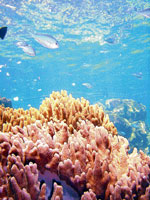Studies seem to indicate that oceans, which are major carbon sinks, may have had enough. If so, the consequences are BAD, writes Jayalakshmi K.
 Ocean
deserts, which are non-productive areas, have increased by 15 per cent in
the period 1998-2007, according to a study done by the National Oceanic and
Atmospheric Administration (NOAA) in the US and the University of Hawaii.
This translates into a total of 6.6 million sq km. On the whole, there are
51 million sq km of such desert zones. The data was collected by Nasa's
orbiting SeaStar craft.
Ocean
deserts, which are non-productive areas, have increased by 15 per cent in
the period 1998-2007, according to a study done by the National Oceanic and
Atmospheric Administration (NOAA) in the US and the University of Hawaii.
This translates into a total of 6.6 million sq km. On the whole, there are
51 million sq km of such desert zones. The data was collected by Nasa's
orbiting SeaStar craft.
Attributed mostly to warming surface waters, which is happening at a rate of
1 per cent every year, this creates many layers in the ocean waters,
preventing deep ocean nutrients from rising to the surface and feeding plant
life.
These areas are found in roughly 20 per
cent of the world's oceans and are within subtropical regions on either side
of the equator. Whether it is due to natural reasons or man-induced is not
known. But, as the study says, it means more loss of marine life.
Half of the carbon dioxide released ends up in the oceans, which in the last
200 years alone amounts to 500 billion tons. So far the acidity of the
oceans due to this carbon content has been constant. But now, the acidity
may be up by 0.1 of a pH unit.
While the figure seems small, it translates to a pH figure lower than in
millions of years and a rate of change 100 times greater than ever. The
Lawrence Livermore National Lab study suggests that even if emissions are
stopped, acidification would continue. The carbon dioxide in the air will
further add up to 0.5 of pH.
Ocean acidity has been largely stable at a pH of 8.2. While the chemical
equilibrium managed to keep things that way, now the geological processes
are unable to keep pace with the way carbon dioxide is increasing. As a
result, acidity has been affected.
Changes in acidity will affect animals like corals, mollusks and plankton
that use calcium carbonate to make their shells. A NERC study (UK) looked at
how phytoplanktons, which provide nutrients for plant life in the oceans,
are affected by increasing acidity. For instance, sea urchins that release
nutrients from the seabed for the planktons were shown to be affected by the
acidity, both in their carbonate skeleton and internal organs.
Yet another study, the Global Carbon Project, shows that the natural systems
are giving up! In terms of removing the greenhouse gases in the atmosphere.
This means both land with its carbon sinks in the green patches and the
oceans. Since 2000, the atmospheric carbon dioxide has increased 35 per cent
faster than expected!
It does not need much imagination to see how the web of life can be damaged,
beginning with sea urchins to planktons to marine life that refuses to take
up anymore carbon dioxide. From there to a runaway greenhouse effect that
turned Venus into a sizzling landscape could be the doing of a mere hundred
years!
As Prof J Srinivasan, CAOS, IISc, notes, not many realise the damage to the
oceans and that is not only from global warming. Acidification is taking a
toll on marine life. Besides the carbon emissions, there is the damage from
all the fertiliser run off too.
The warning bells have not stopped ringing. The effects of a hot planet too
are being experienced. But action has not started on the urgent footing
required. Why? Why, when the technology is all there? Political will or
public apathy? Do we really need calamities to jerk us out of inaction?
Copyright 2007, The Printers (Mysore)
Private Ltd., 75, M.G. Road, Post Box No 5331, Bangalore - 560001
Tel: +91 (80) 25880000 Fax No. +91 (80) 25880523